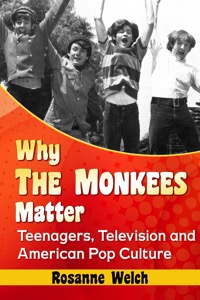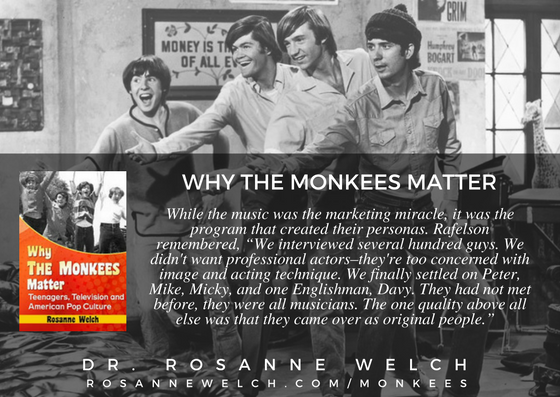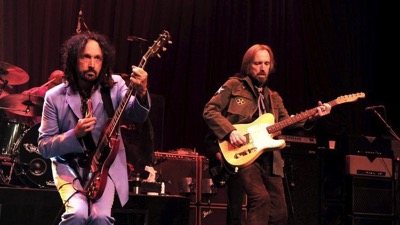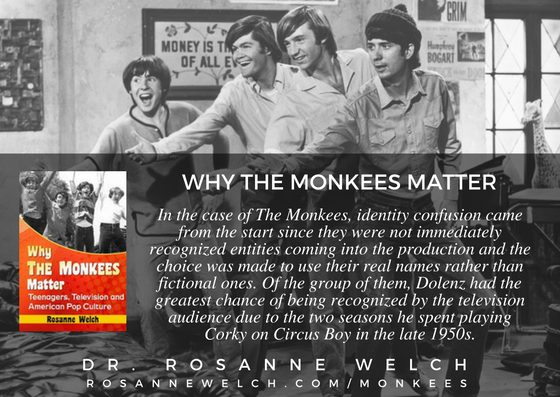Rosanne Welch talks about “Why The Monkees Matter” with Jean Hopkins Power
Watch this entire presentation (45 mins)
Jean Powergirl takes the host reigns and welcomes her guest Rosanne Welch, PhD to the show! They’ll be discussing Roseanne’s book, “Why The Monkees Matter: Teenagers, Television and American Pop Culture.”
Transcript:
Rosanne: He did — as far as instrumentation — when they started to play their own instruments on their 3rd album, Headquarters, he did and from that point on has been playing on stage forever and he was always though to be the most proficient. He plays 6 different instruments. He eventually taught music after the show was over. So he’s quite brilliant in that aspect. He allowed himself thought to be cast as the village idiot in the show.
Jean: You always had to have a ding-y person on there. Right?
Rosanne: I talked to the writers and as they thought of the characters for each of these 4 individuals to make them stand out, they had an option with the last character. He could either be the idiot or he could be the supremely intelligent one who we make fun of because they can’t connect socially.
Jean: They’re nerding out.
Rosanne: Like Sheldon on The Big Bang Theory and the writers admitted that at the last minute they thought we can make more quick jokes about stupid people than we can about smart people. So let’s just choose that.
A hit television show about a fictitious rock band, The Monkees (1966-1968) earned two Emmys–Outstanding Comedy Series and Outstanding Directorial Achievement in Comedy. Capitalizing on the show’s success, the actual band formed by the actors, at their peak, sold more albums than The Beatles and The Rolling Stones combined and set the stage for other musical TV characters from The Partridge Family to Hannah Montana. In the late 1980s, the Monkees began a series of reunion tours that continued into their 50th anniversary.
This book tells the story of The Monkees and how the show changed television, introducing a new generation to the fourth-wall-breaking slapstick created by Laurel and Hardy and the Marx Brothers. Its creators contributed to the innovative film and television of 1970s with projects like Bob & Carol & Ted & Alice, The Mary Tyler Moore Show, Laugh-In and Welcome Back, Kotter. Immense profits from the show, its music and its merchandising funded the producers’ move into films such as Head, Easy Rider and Five Easy Pieces.
Rosanne Welch, PhD has written for television (Touched by an Angel, Picket Fences) and print (Three Ring Circus: How Real Couples Balance Marriage, Work and Kids and The Encyclopedia of Women in Aviation and Space). In the documentary world she has written and produced Bill Clinton and the Boys Nation Class of 1963 for ABC NEWS/Nightline and consulted on PBS’s A Prince Among Slaves, the story of a prince from West Africa who was enslaved in the 1780s, freed by order of President John Quincy Adams in the 1820s and returned to his homeland.
Podcast: Play in new window | Download
Subscribe: RSS
![22: More on Peter Tork and The Monkees : “Why The Monkees Matter” Interview with Jean Power [Video] (0:54)](https://rosannewelch.com/wp-content/uploads/2017/10/rmw-power-22-peter-tork-2.jpeg)



![21: Peter Tork and The Monkees : “Why The Monkees Matter” Interview with Jean Power [Video] (0:55)](https://rosannewelch.com/wp-content/uploads/2017/10/rmw-power-21-peter-tork.jpeg)


![20: Even More on Davy Jones and The Monkees : “Why The Monkees Matter” Interview with Jean Power [Video] (0:57)](https://rosannewelch.com/wp-content/uploads/2017/09/rmw-power-20-davy-jones-3-1.jpeg)


